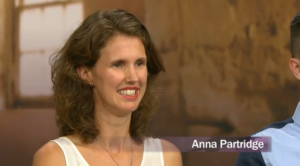 On Tuesday night this week, I was in the audience of SBS Insight talking about sibling rivalry. I admitted on national television that my kids fight – a lot! Some days (especially school holidays) it can be 6 or 7 times a day.
On Tuesday night this week, I was in the audience of SBS Insight talking about sibling rivalry. I admitted on national television that my kids fight – a lot! Some days (especially school holidays) it can be 6 or 7 times a day.
I even said that I let my kids fight.
My kids appeared on the show and were asked if they remembered their last fight together… each had a different version and it was priceless watching my youngest spill the beans.
Why did I do this?
Because I believe that kids’ fighting is not necessarily a bad thing and I wanted to give other parents hope that while our kids fight they are learning valuable, life long lessons and skills.
Here’s my take on sibling rivalry….
Kids live completely in the moment. They might fight over who gets the red cup and who gets the blue cup and to use it sounds like world war 111 but within minutes – if not seconds, they have forgotten about the colour of the cup and are happily drinking their milk together.
If you kids are close in age (I had three kids in just over 4 years) they will be in each other’s space – constantly. They will be playing with the same toys, wanting to get on the same swing, bathing together, eating together, watching television together, all trying to sit on your knee together. And when they are in each other’s space – they are like little lion cubs and need to lash out every now and again.
Kids are territorial. Just like an animal instinct, if something belongs to them – it is ‘mine’ not ‘yours’. So if someone touches your stuff, you will react accordingly. Probably 50 per cent of the fights in our house are because someone has something of someone else’s – it could be the lid of their texta but it was theirs and they don’t want anyone else to have it.
It is our job as parents to set up a positive home environment so they can learn valuable lessons from this rivalry.
Here is why fighting is OK…. (and I promise, this is based on research!).
- It builds emotional intelligence
- Children learn about regulating their own emotions and how they can affect the emotions of others
- It builds resilience
- Children are learning the problem solving skills to bounce back after a fight with another sibling
- It forms the basis of future relationships from a very young age
- Learning how to navigate relationships is tricky at any age and by engaging in simple conflict at a young age, we learn the necessary skills to engage in harder conflict later in life. It also builds social skills out of relationship building.
However, they are only going to learn these skills if we help them along the way. Firstly, we need to leave them for a certain time to have their fight. We can’t jump in too soon or we have wasted an entire learning opportunity.
Secondly, we need to teach them strategies to deal with conflict such as taking time out, talking it out, apologizing, creating a pattern interrupt and assessing the emotions of others and ourselves. We do this by talking to our children after a conflict – like 24 hours after when it has all died down and they can be rational again.
If the fighting is getting out of control, here are a few things you can do to calm it down.
- Create a pattern interrupt
- If your children are going at it hammer and tongs, change the situation. It might be to pack everyone up and take them to the park. Or bring a new toy in to the mix. Distract them with food or a different conversation.
- Check if your children’s needsare being met
- Are they hungry, overtired, thirsty, exhausted, over stimulated, had too much screen time, not had enough exercise that day, been doing too much in their day or emotionally spent or are we giving them too many instructions to get out of the house in the morning?
- Provide opportunities to have fun
- Life can get too serious for our kids. If we are running from our job, to school pick up, home to cook dinner and stressed about the washing, finances or whatever it is – it is easy to slip in to the everyday of life. Kids need to have fun, so lighten it up. Take them to the park. Pull funny faces. Put the music on and have a dance session. Look back over old photos as a slide show on the computer. Say YES to their requests to have ice cream after school or to go to the park.
- Validate emotions, but don’t fix
- During or after a fight, it is important to validate each person’s emotions, but don’t try to fix them straight away. Agree it can feel bad after you fight with someone but allow your children time to develop their own strategies to fix the situation. (Then talk about it 24 hours later to give further strategies and support when needed).
When is sibling rivalry bad?
- When it become physical
- We have a rule in our house ‘No hurting self, No hurting others, No hurting property’ (I think I stole it from Maggie Dent, but it sure works). Even in the heat of the moment, this is observed. If there is any sort of physical aggression in sibling rivalry it needs to stop right away as it can play out on the playground and in later life.
- When there is a victim/bully situation
- The definition of a bully is when there is a prolonged attack from one person (bully) on another person (victim). It has to be ongoing and harmful. If this happens in siblings, this is also bad. Setting up these sorts of behaviours is harmful to relationships building later in life and even lead to ongoing learning difficulties and mental health issues.
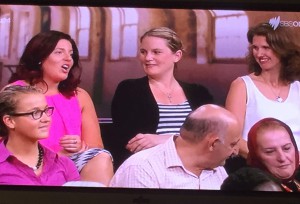 Also in the audience with me on the show was a mother who admitted to having a favourite child and this caused a lot of controversy! Parents are meant to love unconditionally, right? Perhaps she did love both her children just as much but had had a serious marriage breakdown and her first son reminded her of her husband so much that she gravitated to her youngest. Or perhaps her first son was stronger and didn’t need as much attention – who knows? But it sure created a stir for a few days in the media!
Also in the audience with me on the show was a mother who admitted to having a favourite child and this caused a lot of controversy! Parents are meant to love unconditionally, right? Perhaps she did love both her children just as much but had had a serious marriage breakdown and her first son reminded her of her husband so much that she gravitated to her youngest. Or perhaps her first son was stronger and didn’t need as much attention – who knows? But it sure created a stir for a few days in the media!
An Iranian family talked about their eldest son being their favourite – this is their culture and the eldest son hold the pedestal in the family. He is responsible for caring for the siblings and was very set in his views over arranged marriage for his sister – his decision swayed the parents. He also talked of his need to flee his family to safer ground and all of the 5 children in the family had to stick together out of need of survival. A totally different perspective of why we need our siblings.
Families and sibling relationships are certainly interesting and it is our job as parents to set up the best environment for our children to build strong relationships with their siblings and deal with conflict in a positive way.
You can watch the full program here…
Enjoyed the read? Get my FREE eBook ‘How to put your kids to bed and keep them there: 5 steps to a stress free bedtime routine’ here.
About the Author
Anna Partridge is a Parent Educator, School Teacher and regular contributor to Huffington Post. She is also mum to three beautiful, highly spirited children aged 10, 8 and 6. Anna created Positive Parenting with Anna Partridge to share the inspirations and joys of raising the next generation and to allow parents to think about the ‘big picture’ of parenting by providing tips and advice to instil the right habits, values and beliefs in their children from the start. www.annapartridge.com


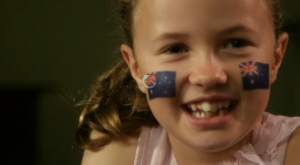


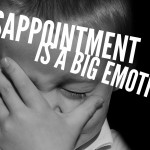
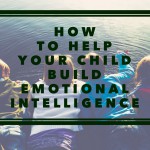


I watched it Anna! You and your children did so well! I only have the one child at the moment but this is such a useful article for parents with more than one (and gives me an insight of what I may have to look forward to one day!).
Great you saw it. The film crew came out to our house for a few hours and interviewed my kids – I had no idea what they were going to say and was glad it came out like it did! Yes… when you have your next one you will be ready.
Interesting, I probably jump in to early to solve my kids problems and show then how to take turns, etc. Emotional regulation is easier for some kids than others and we do need to give them tools to help them cope.
Yes! I agree emotional regulation is easier for some kids rather then others and remember that my kids are now 10, 8 and 5 and so over the toddler age which is crucial for learning taking turns and sharing. I agree these skills need to be taught in a more gentle manner and letting toddlers fight serves no purpose… but as they grow older – this is the time they can learn from their relationships.
Great tips to keep in mind here – My boys are five years apart but they are getting to the fighting stage. I think it helps to keep in mind that we expect A LOT of kids in terms of sharing that we don’t expect of adults.
Yes! Great thought… we do expect a lot.
Great post! My kids fight constantly and I let it happen for these same reasons unless things escalate.
I can only imagine with 6 kids! Good on you.
I completely agree with you that siblings fighting is not such a bad thing. It gives them essential developmental skills in a safe (unless it turns physical) environment. Great post!
Thanks Karin! Yep, I think I put in the post that we have a rule that we don’t hurt each other, hurt property or hurt ourselves and that generally works.
Glad to hear kids fighting isn’t necessarily a bad thing. My 2 are only 3.5 & 20 months, but they’re both right in the “mine” stage where everything is theirs, including me! But it’s generally all over in less than 5 minutes…
That is a great example of kids living in the moment! Love it.
I honestly think it would do my head in if I tried to eliminate my kids’ spats and spars. I think it is quite natural to argue and carry on when you are with another person for as long as siblings are. Especially a ‘rival’ person. It’s the rivalry that I spend my time trying to extinguish, not the fights. Well done to you for going on TV, Anna! I’ve never had the guts. x
Thanks Maxabella! Funny you say about going on TV – for the majority of my career I have worked in Public Relations and briefed everyone else for appearing in media so when it was my turn, it was a little nerve racking. One of my CEOs called me ‘pushy hands’ because I would fluff them all up, tell them exactly what to say and then push them on with utter and complete confidence even if they didn’t have it. A little harder to do it for myself!! You would be great on TV!! I reckon you should do it and I’ll brief you – deal?!
My brother and I fought so much that it put me off having more than one child myself – I didn’t want her to have a childhood like mine. Perhaps it gave me a high EQ and resilience? Nice to think something good might have come out of it! Happily my brother and I get along these days, but I have the worst memories of us fighting.
My brothers goal was to make me cry every day when I was between the age of about 6 and 9 and they succeed most days!! I also now get on with them really well and I think it was because we lived on a farm and just had each other all day every day (unless we were at school) so it was the being in each others space thing that was hard. I see the same with my kids and can only hope they will grow up to be friends if I can turn the fights into learning opportunities. Thanks for sharing! And you would be great with another one. xx